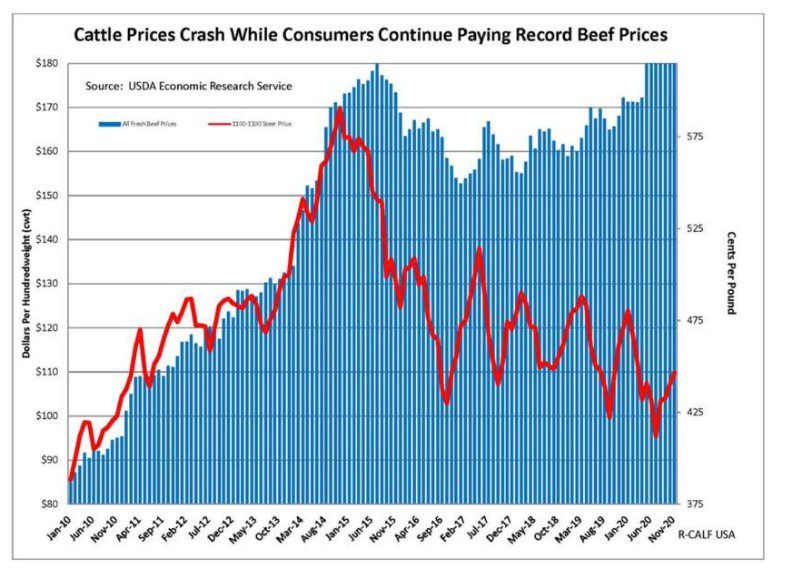Author, Farmer, and Economist Michael Smith briefly talking returns to Cattle Ranchers and profits to meat processors and retail. The beef industry is under fire, we’ve been seeing this for years. We first saw where Smithfield has taken over whole towns for pork production, vertically integrating as much as possible, even to take a cut of the feed grain market in those towns. This provides the blueprint for a bigger industry, beef. Matt Stoller is Research Director for the American Economic Liberties Project, his piece gets into the grit of it: Economists to Cattle Ranchers: Stop Being So Emotional About the Monopolies Devouring Your Family Businesses,” BIG News Letter by Matt Stoller (substack.com) A few takeaways: “Higher meat
Topics:
run75441 considers the following as important: Cattle, farm subsidies, Farming, Featured Stories, Michael Smith, politics, US EConomics
This could be interesting, too:
Robert Skidelsky writes Lord Skidelsky to ask His Majesty’s Government what is their policy with regard to the Ukraine war following the new policy of the government of the United States of America.
NewDealdemocrat writes JOLTS revisions from Yesterday’s Report
Joel Eissenberg writes No Invading Allies Act
Ken Melvin writes A Developed Taste
Author, Farmer, and Economist Michael Smith briefly talking returns to Cattle Ranchers and profits to meat processors and retail.
The beef industry is under fire, we’ve been seeing this for years. We first saw where Smithfield has taken over whole towns for pork production, vertically integrating as much as possible, even to take a cut of the feed grain market in those towns. This provides the blueprint for a bigger industry, beef.
Matt Stoller is Research Director for the American Economic Liberties Project, his piece gets into the grit of it:
Economists to Cattle Ranchers: Stop Being So Emotional About the Monopolies Devouring Your Family Businesses,” BIG News Letter by Matt Stoller (substack.com)
A few takeaways:
“Higher meat prices are responsible for roughly half the annual increase in food prices, and food inflation is not only stretching household budgets, but has created a serious political problem for the White House. In September, the Biden administration attacked the industry over high prices, calling for an end to “pandemic profiteering.”
“Grassley’s chokepoint comment is right; for every dollar Americans spend on food, only 14.3 cents goes to the farmer. And much of the rest of it goes to the middlemen. JBS, for instance, paid out a record $2.3 billion in dividends in 2020, and plans to increase that by 75% this year.”
Yet we see higher prices at the grocery store. The processors and retailers Cargill and Kroger, respectively) dominate the pricing game. But there are new disparities in the economics.
“To cattle ranchers, who actually sell the cows to packers that are turned into beef, the crisis is not high prices, but low prices. They aren’t getting very much for their cattle. This is weird, because, normally, beef and cattle prices move in tandem – the current high beef prices should result in high cattle prices.”
Margin spread over the past few years and the divergence:

Should, but now doesn’t. There isn’t another opportunity for ranches to sell and make a decent return on investment and these companies know this. The monopolistic charm is pushing production prices to the floor. Once bankrupted, Cargill can hope to mop up assets at fire sale prices and vertically integrate the front end of the process with their back end.
The opposition, however is a bunch of well connected land owners and a powerful lobbying group called the National Cattlemens Beef Association, or the Cattlemen for short. There are actually more than just the Cattlemens Association going after this issue, which is probably why Secretary Vilsack has been pushing middle market solutions.
U.S. Ag Secretary Vilsack to Focus on Building Markets | Main Edition | lancasterfarming.com
Mr. Stoller smells reform in the air, and Chuck Grassley seems to be championing the cause, with multiple efforts by ranchers to out wind in the sails. We are about to see a showdown over the Wests most iconic industry.
